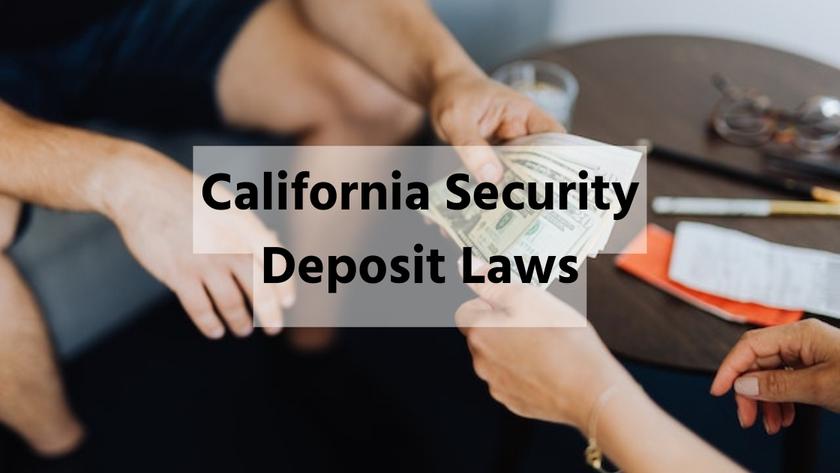California Security Deposit Laws

Being familiar with California security deposit laws is essential for landlords. If you are a landlord, collecting reasonable security deposits from your residents at the beginning of the lease agreement can be beneficial to you and your rental unit for many reasons. A deposit can help you cover many unexpected costs, including:
- Unpaid utilities: When a tenant is occupying your rental, they are responsible for the cost of utilities. However, if the tenant fails to pay them, a landlord may withhold part of the money to cover the cost.
- Excessive cleaning costs: Under most leases, it is understood that every tenant must leave the unit in the same state of cleanliness it was in the period they moved in. If the tenant leaves the home in an excessive state of uncleanliness, the landlord may use the security deposit to cover cleaning expenses.
- Unpaid rent: If a tenant fails to pay monthly rent, it is considered a breach of contract. Should this happen, a landlord may use the funds to make up for lost rent funds.
- Lost rental income: Sometimes, residents choose to break their lease early and abandon the rental. Should this happen, the landlord is entitled to keep a portion of the tenant’s deposit to cover lost rent.
- Repairs: If the tenant abuses the unit or causes damage beyond normal wear and tear, landlords may make deductions or use the full deposit to cover the cost of repair.
To help each real estate owner understand the current laws regarding California security deposits, we have provided a comprehensive guide. So, here’s what property owners need to know about California law concerning deposits!
Security Deposit Limit
Many states, including California, have laws that specify the maximum amount landlords can charge for security deposits, a key consideration in property management.

Under California law, there is a maximum security deposit of two months’ rent if the rental unit is an unfurnished home, and three months’ rent if they’re furnished units. Additionally, if the renter owns a waterbed, the landlord may request to add half a month’s rent to the security deposit. Further, a landlord may ask for a pet deposit if the tenant’s pet is not a service animal.
Non-Refundable Fees
California does not allow non-refundable fees, as all deposits are subject to be refunded. California state law strictly prohibits lease agreements that include non-refundable security deposits.
Storing a Tenant’s Deposit
In property management, some states have laws dictating how landlords must hold security deposits during a tenancy. However, California’s landlord-tenant laws do not specify such rules, and landlords are not bound to any particular method of holding these funds.
Written Notice After Security Deposit
In California, a property owner is not explicitly required to provide tenants with a notice regarding the receipt of their deposit.
Reasons to Withhold a Security Deposit
There are a few reasons why a landlord would be legally allowed to withhold some or all of a tenant’s security deposit. This includes the following:
- Unpaid Rent: If a tenant fails to pay rent, the landlord may keep security deposits to make up for lost income.
- Making repairs: If a tenant causes damage to the rental that is not just normal wear and tear, then the security deposit may be used to cover the repair. Normal wear and tear is considered wear from everyday use.

- Cleaning costs: At the end of a lease, under state law, the rental must return to the state of cleanliness that it was in before the tenant moved in. If the home is not adequately cleaned, then the security deposit can be used to bring it back to its original state of cleanliness. The landlord can deduct the cost of cleaning.
- Restoration costs that were detailed in the lease or rental agreement.
Walk Through Inspections
The initial inspection of the rental can occur less than 2 weeks before the end of the rental agreement, and it is optional for the tenant.
This means the landlord can do a walk-through inspection with the tenant to point out any potential damage or issues on the premises that exceed normal wear and tear. This allows the tenant time to fix the problems before the end of the rental agreement and potentially minimize the deductions on their security deposit.
If an initial inspection is conducted, the landlord must provide the tenant with a list of repairs and cleanings.
Security Deposit Refund Under California Law
After the lease has ended and the tenant has vacated the unit, landlords have 21 days to return the tenant’s security deposit. If the landlord is withholding the security deposit, they must provide the tenant with an itemized list of deductions on written notice. This notice must be delivered either in person or via mail.

If there are security deposit disputes, such as the landlord fails to return the security deposit when they are obligated to, the tenant may then sue the landlord via small claims court to recover the funds they are owed.
If the landlord was found to be acting in “bad faith” during the dispute settled in California courts, then the small claims court may state that they must pay the tenant two times the amount of the security deposit, in addition to the money that the tenant was already owed.
Change in Property Ownership
Under California law, if a landlord decides to sell or transfer the ownership of their rental, the landlord may do one of two things.
The landlord might transfer the security deposit funds to the new owner via or first class mail. Alternatively, the landlord may return the funds to the tenant as they would at the end of a lease. The landlord must decide which action to take before they sell the property and inform the new owner.
Bottom Line
Hiring a management company can help put your mind at ease when dealing with security deposit laws in California. Here at IPM Property Management we understand all aspects of the landlord-tenant law. Let us help you manage your rental property!
Disclaimer: This blog post should not be taken as a replacement for legal advice from a licensed attorney. Laws can frequently change and this post may not be up to date at the time of your reading. Please contact us if you have any questions regarding this topic or if you have any other property management needs!
